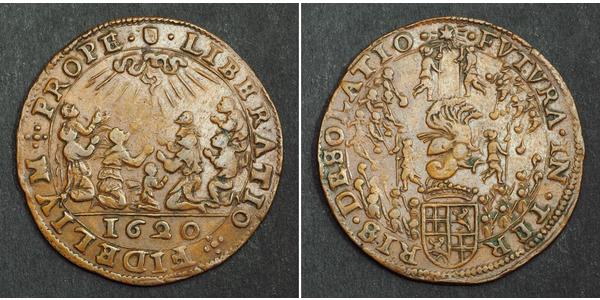(sold for $80.0)
Mint Year: 1620 Condition: Minor deposits, otherwise XF! Reference: Dugniolle 3764, van Loon II 129. Denomination: Small Medal / Jetton - Dutch Aid for the German Protestant Princes Material: Bronze Diameter: 31mm Weight: 5.97gm
The Republic of the Seven United Netherlands (or "of the Seven United Provinces") (Republiek der Zeven Verenigde Nederlanden/Provinciën; also Dutch Republic or United Provinces in short, Foederatae Belgii Provinciae or Belgica Foederata in Latin) was a European republic between 1581 and 1795, in about the same location as the modern Kingdom of the Netherlands, which is the successor state.
Before 1581, the area of the Low Countries consisted of a number of duchies, counties, and independent bishoprics, some but not all of them part of the Holy Roman Empire. Today that area is divided between the Netherlands, Belgium, Luxembourg and parts of France and Germany. The Low Countries in the 16th century roughly corresponded to the Seventeen Provinces covered by the Pragmatic Sanction of 1549 of Holy Roman Emperor Charles V.
Through marriage, war or sale, these states were acquired by the Habsburg emperor Charles V and his son, king Philip II of Spain. In 1568, the Netherlands, led by William I of Orange, revolted against Philip II because of high taxes, persecution of Protestants by the government, and Philip's efforts to modernize and centralize the devolved medieval government structures of the provinces. This was the start of the Eighty Years' War.
In 1579, a number of the northern provinces of the Netherlands signed the Union of Utrecht, in which they promised to support each other in their defence against the Spanish army. This was followed in 1581 by the Act of Abjuration, the declaration of independence in which the provinces officially deposed Philip II.
The United Provinces first tried to choose their own lord, and they asked the Duke of Anjou (sovereign from 1581-1583) to rule them. Later, after the assassination of William of Orange (July 10, 1584), both Henry III of France and Elizabeth I of England declined the offer of sovereignty. However, the latter agreed to turn the United Provinces into a protectorate of England (Treaty of Nonsuch, 1585), and sent the Earl of Leicester as governor-general. This was not a success, and in 1588 the provinces became a Republic.
Only 1$ shipping for each additional item purchased!

|
Posted by:
anonymous 2019-09-05 |
8 Maravedi Kingdom of Spain (1814 - 1873) Copper Isabella II ...
group has 4 coins / 2 prices
⇑
5 Zloty Second Polish Republic (1918 - 1939) Silver Józef Pi ...
group has 23 coins / 17 prices
⇑






-300-150-3EmsHgTyjVUAAAGOWPsHkTUG.jpg)

-300-150-n8oKbzbiDXIAAAFRm0eWyns1.jpg)






